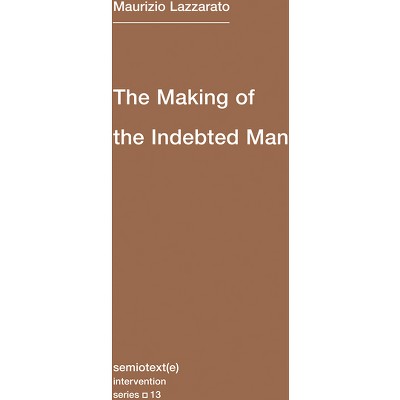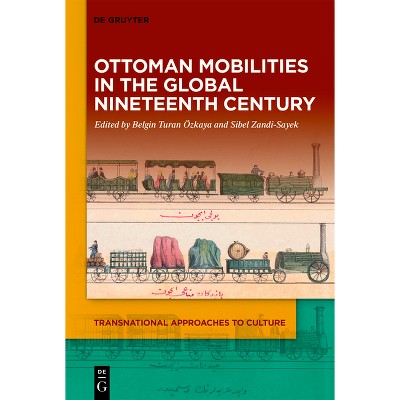Sponsored

Indebted Mobilities - by Susan Thomas (Hardcover)
In Stock
Sponsored
About this item
Highlights
- An ethnographic rendering of overseas students' fraught encounters studying at an American public university.
- About the Author: Susan Thomas is assistant professor of cultural foundations of education in Syracuse University's School of Education.
- 232 Pages
- Education, Higher
Description
About the Book
"As state funding to public universities becomes increasingly scarce, many universities have turned to a new student population to draw in revenue: international students. Typically fluent in English, and overwhelmingly enrolled in high-skill professional fields, students from India have consistently served as one of the most valuable student-migrant populations, and the United States has been their most popular destination. Assumed to be rationally calculating, ambitious, and globally minded consumers of higher education, these migrant youth are depicted as success stories of the global neoliberalization of education. But not all are wealthy or savvy, nor do they necessarily end up in a program that will leave them better off. Sociologist Susan Thomas followed a group of Indian middle-class men studying at a public university in New York for 16 months as they attended classes, worked in under-paid or unpaid research jobs, and socialized with each other. Thomas's ethnographic research shows that these men see themselves as pursuing successful careers, paths that they uniquely deserve due to their work ethic and intelligence. At the same time, that pathway is entangled within webs of obligation tethered to the imagined future returns of an American education. For these students, such obligations translate into an experience of indebtedness-materially, affectively, and morally. The students consider themselves the beneficiaries of an American education, accruing considerable financial debt to pay tuition and perceived moral debt to their families for the opportunity to study in the US, at the same time that they are marginalized on campus and off. They thus develop a logic of owing and being owed as a way to reconcile the ambivalences they experience while located on an American campus where they must form racial and class sensibilities as South Asian student-migrants. As students approach graduation, however, they are forced to reconcile the debts they have accrued with an uncertain return. Their final days on campus forced a reckoning with their anxieties about successful masculinities, which manifested through competitive frictions with one another, the uncertainties of supporting existing or future households, and the precarity of being drawn into the global knowledge economy as indebted migrants. Thomas illuminates not only how students' movements across national borders are an invaluable part of the neoliberalization of education, but also how this system forms indebted subjectivities"--Book Synopsis
An ethnographic rendering of overseas students' fraught encounters studying at an American public university. As states have reduced funding to public universities, many of those institutions have turned to overseas students as a vital, alternative source of revenue. Students from India have especially been seen as among the most desirable populations, as they're typically fluent in English and overwhelmingly enroll in professional fields deemed critical to the knowledge economy. The large numbers of these youth migrating for their education tend to be viewed as a shining example of the value of the contemporary global university and how it enables ambitious people to secure opportunities not available to them in their home nation. However, a deeper examination of these young people's encounters reveals a more complicated story than glossy brochures and paeans to American higher education would suggest. Indebted Mobilities draws on Susan Thomas's close shadowing of a group of middle-class Indian migrant men who attended a public university in New York just as the institution sought to "internationalize" its campus in the wake of ongoing withdrawal of state funding. Thomas takes the reader along with the young men as they study, work, and socialize, pursuing the successful futures they believed to be promised when they migrated for an American education. All the while, they must face their marginalization as they become enmeshed in the fraught inclusion politics of contemporary university life in the United States. At the heart of these encounters is these students' relationship to debt--not just material ones that include student loans, but moral and affective debts as well. This indebtedness, which keeps them tied to both India and the United States, is meaningful to how Indian middle-class men make sense of their experiences as student-migrants. These youth long to be modern "men of the world." Yet Thomas illuminates how the complex realities that arise for them, informed by the logic of US exceptionalism, force a reckoning with their anxieties about successful masculinities and the precarity of being drawn into the global knowledge economy as indebted migrants.Review Quotes
-- "Contemporary Sociology"
"Indebted Mobilities is a vital text that situates international students not as peripheral actors but as central figures in the global story of higher education. For historians, educators, policymakers, and all who have ever navigated these uncertain terrains, this book offers not only insight but also recognition."-- "Asian Studies Review"
"Indebted Mobilities: Indian Youth, Migration, and the Internationalizing University, authored by Susan Thomas, offers a compelling analysis of student life in the American university. Using an in-depth ethnographic approach, she gathers rich and nuanced data from Riverside University in America, specifically studying Indian students. Her research uncovers the intricate network of economic and social obstacles that Indian students encounter in the pursuit of social advancement. These challenges encompass financial crises, housing difficulties, labor issues, policing concerns, adverse living conditions, what she termed 'indebted mobility.' She also incorporates the perspectives of Pakistani, Bangladeshi, and Indian Muslim migrants and investigates the culture embedded in the relationship between university and how Indian migrant youth locate themselves." -- "Compare: A Journal of Comparative and International Education"
"Thomas delicately holds together the constellation of privilege and marginalization that Indian migrant men move through and she concludes by considering how indebtedness can be extended beyond hegemonic obligations. The book will be of interest to scholars and students of migration and education, especially those who want to locate the movements of individuals in questions of power, history, and geopolitics."-- "Anthropology & Education Quarterly"
"Through in-depth ethnographic research and deft and incisive theorizing, Susan Thomas' Indebted Mobilities pries open the nexus of migration and education in the world today. Taking as her case study an internationalizing public university in the United States, she delves deeply into the experiences and aspirations of male student-migrants from India within the neoliberal university. Pushing against stereotypes of international students as simply privileged economic actors, she carefully lays bare the material, affective and cultural logics of debt that shape their trajectories across transnational boundaries, astutely draws out the masculinist underpinnings of their hopes and dreams and reveals the racialized dynamics of surveillance and labor that mark their experiences within a post-9/11 landscape. This is a theoretically sophisticated, rich, and beautifully written ethnographic exploration that is a novel and original contribution to studies of migration, education, neoliberalism, transnationalism, and diaspora."
"Indebted Mobilities is a deeply theorized and beautifully written ethnography based on rich and nuanced data that challenges monolithic understandings of international students in higher education. The book makes important contributions to the scholarship on the globalization of higher education, transnationalism, and Asian racialization." --Stacey J. Lee, author of "Resisting Asian American Invisibility: The Politics of Race and Education"
"Indebted Mobilities takes us into the lives of middle-class students from India who are trying to navigate complicated systems of surveillance, labor, belonging, and exclusion, all while chasing after their 'American dream' of higher education and work opportunities. Rather than stand as examples of prototypical neoliberalism, Thomas' rich ethnography reveals how these men are caught in a 'cultural logic of indebtedness, ' whereby their integration and dispensability are woven into the very fabric of internationalizing universities today."--Amy Bhatt, author of "High-Tech Housewives: Indian IT Workers, Gendered Labor, and Transmigration"
"In Indebted Mobilities, Thomas sets out to understand the tensions that emerge as overseas students from South Asia increasingly become part of the student body at US universities seeking to internationalize their campuses. Along with raising pertinent issues of labor, housing, policing, and masculinity, the book offers an especially important discussion of how these young people's lives are implicated by the new institutional forms of surveillance and monitoring that emerged as an effect of the War on Terror. While many scholars have discussed the ways biopolitical management has been transformed by the intensification of "security" discourse after 9/11, few have been able to identify - and then ethnographically explore - new institutional sites where this management takes place. Thomas has done just this, seeing a logic of indebtedness as a key conceptual frame that indexes not only actual monetary relations but also spatial networks as an important new regulatory regime, and therefore a space in which new subjectivities are being developed. Her insights here contribute to the literatures on diaspora and transnationalism, as well as shedding light on the institutional and affective dimensions of the shift to a security state."--Deborah A. Thomas, author of "Exceptional Violence: Embodied Citizenship in Transnational Jamaica"
"Most scholars of global education study the university as that institution through which people flow, the brick and mortar of already accumulated capital. Susan Thomas's revelatory book, however, teaches us to see the people, their raced and gendered migratory routes, paths of indebtedness and living labor, as the true dynamic of global education. We come to see the university as a threshold, the encounter, through which a student life is lived." --Isaac Kamola, author of "Making the World Global: U.S. Universities and the Production of the Global Imaginary"
"Thomas's compelling ethnography follows a group of Indian student-migrant men at a public university as they navigate the raced, classed, and gendered terrain of U.S. higher education and the post-9/11 security state. These men imagine studying in the US as an important step towards achieving successful modern manhood, and thus they incur large debts--both financial and familial--to make the journey. To the U.S. university, these students are a source of revenue, a reserve of low-wage campus workers, and signifiers of university commitments to diversity and inclusion. Thomas finds that their experiences on campus were primarily marked by exclusion and marginalization, and the futures they longed for increasingly uncertain. International students provide a much-needed lens into understanding the workings--and failures--of the neoliberal and globalizing U.S. university. Indebted Mobilities is an essential contribution to critical university studies and American Studies. It is simultaneously an important text about transnationalism, highlighting both the historical and contemporary entanglements between India and the U.S., and the role of Indian middle-class mobilities in bolstering US exceptionalism."--Neha Vora, author of "Teach for Arabia: American Universities, Liberalism, and Transnational Qatar"
About the Author
Susan Thomas is assistant professor of cultural foundations of education in Syracuse University's School of Education.Shipping details
Return details
Trending Non-Fiction

















